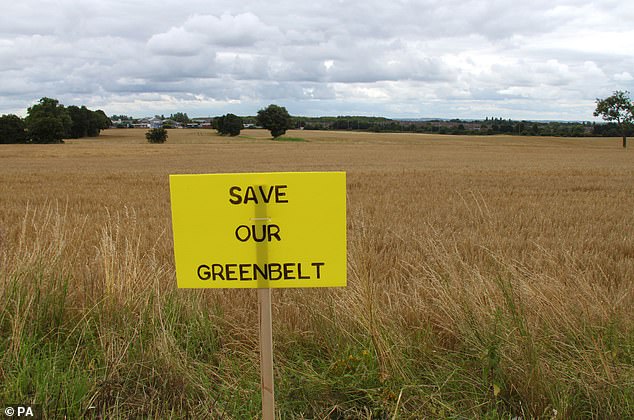Table of Contents
It’s every homeowner’s worst nightmare. First, the fences go up around the picturesque field or vacant lot that your house has dominated since you moved in.
Then the hard hats and bulldozers start appearing and before you know it, you’ve got a block of flats rising up in your garden or a new housing development that’s twice the size of your village.
Millions of homeowners are preparing for this new reality as Labour pushes ahead with plans to build 1.5 million new homes.
Last week, the new Chancellor of the Exchequer, Rachel Reeves, announced plans to force local councils to approve new housing projects, even when communities vehemently oppose them.
Millions of homeowners are bracing for the future of Labour, which is pushing ahead with plans to build 1.5 million new homes
Opposing new construction is often negatively labelled as nimbyism. Nimbys are often pigeonholed as people who selfishly oppose having their own views ruined or their way of life changed.
But often residents who oppose new plans simply point out flaws that could put unsustainable pressure on local areas.
As Councillor Claire Holland, housing spokesperson for the Local Government Association, says: “Nothing can replace local knowledge and decision-making by councils and communities who know their areas better than anyone else.”
A spokesman for the Community Planning Alliance, a non-profit group of grassroots activists, added: ‘Labour leaders must understand that communities are not blockers.
‘Nimby is a pejorative term used to disparage those who have genuine concerns about planning proposals.’
What can you do if you’re concerned about proposed development projects in your area? Here’s Money Mail’s guide to being a loud and proud super Nimby.
Discover the plan
All local planning authorities in England and Wales must have a local plan for their area. This plan guides decisions about future development proposals and addresses the needs and opportunities of the area.
The topics that are usually discussed are housing, employment and commerce. Areas where development should be carried out and areas where it should be restricted are also identified.
Reading the Local Plan for your area should reveal proposals and restrictions where you live, and give you ammunition to challenge if the development is at odds with the stated plan.

Restrictions: Every local planning authority in England and Wales must have a Local Plan for its area.
“The first place to start is with the local planning authority,” says Duncan Reeves, a member of the Albrighton Town Action Group campaigning against the building of 800 new homes on green belt land around the town in East Shropshire.
“Make sure your local council has an up-to-date local plan. Make sure they have a confirmed five-year housing supply plan. If you don’t have these plans, you risk over-speculative development,” he warns.
You can find your local authority’s plan at planningportal.co.uk/find-your-local-planning-authority.
Mobilize
Join your neighbours to form an official campaign group. “Quickly mobilise like-minded people in your community,” advises Mr Reeves. “It takes time, effort, energy and fundraising to fight these wealthy property developers.”
You can start by organizing a meetup for people who agree with your cause. Creating a Facebook group can also be a good way to share the latest information and attract new members.
Volunteers can help in any way they can, whether it’s putting up campaign posters, handing out flyers, chairing informal sessions, supporting objections or raising money for the cause.
Petition
Write a petition describing what residents object to and why. Be specific and support your objections with evidence.
For example, the National Planning Policy Framework states in paragraph 103 that no construction should be done on open spaces unless certain criteria are met.
If the planning application does not meet these requirements, please include this in your objection. Find the National Planning Policy Framework on gov.uk.
Any British citizen resident in the UK can submit a petition at petition.parliament.uk. It must be supported by five people, after which it is reviewed by the Petitions Committee and published online.

Petition: When local communities are passionate about their area, there is often a groundswell of support to block projects.
Once 10,000 signatures are reached, the government is obliged to respond. Petitions that receive 100,000 signatures are considered for debate in Parliament.
Most objections to local planning are unlikely to reach 10,000 signatures, but Reeves says they are still worth pursuing.
They can demonstrate the level of objection of residents towards local authorities, media and decision makers.
For example, Mr Reeves says that of Albrighton’s 4,500 residents, 3,500 have signed a petition to block green belt development.
“This is local democracy in action,” he adds.
You can also create petitions for free on change.org and most local councils have the option to create petitions to raise public concerns about any local issue. Check your local council’s website.
Leverage skills
Recognize talent and leverage the skills of your community.
Those with legal or marketing knowledge can help create a stronger argument against the developments and then promote the cause.
There may be people who work for the council or have experience in the property industry living in the area.
“We need to try to include people with a wide range of professional skills,” says Reeves. “One of our activists works in public relations and has helped ensure a strong media campaign and consistent communication with the people we are trying to protect.”
Don’t do it alone
When you’re up against property developers, some of whom have deep pockets, political clout and strong relationships with local planning authorities, it can feel like David fighting Goliath.
“You can feel like you’re the only one stuck in this situation,” says Stephanie, 71, a resident of the Suffolk village of Thurston, where four new developments have been built in the past five years, boosting the population from 1,700 to more than 5,000. “It’s harder if you feel like you’re fighting project after project.”
If there are a number of developments planned in your wider area, join forces to support each other.
You can also sign up for the Community Planning Alliance, a volunteer-run nonprofit group founded in March 2021 whose mission is to unite and assist grassroots activists.
More than 700 local campaign groups are registered, with concerns ranging from housing, roads and solar farms to the protection of wildlife and green spaces.
When planning developments in green belt areas that are not designated as brownfields or ‘grey belt’, Mr Reeves recommends contacting the charity Campaign To Protect Rural England.
- Do you have any objections to building projects in your area? Let us know: moneymail@dailymail.co.uk
SAVE MONEY, EARN MONEY

Boosting investment

Boosting investment
5.09% cash for Isa investors

Cash Isa at 5.17%

Cash Isa at 5.17%
Includes 0.88% bonus for one year

Free stock offer

Free stock offer
No account fees and free stock trading
5.78% savings
5.78% savings
You have 365 days’ notice

Fiber broadband

Fiber broadband
BT £50 Reward Card: £30.99 for 24 months
Affiliate links: If you purchase a product This is Money may earn a commission. These offers are chosen by our editorial team as we believe they are worth highlighting. This does not affect our editorial independence.
Some links in this article may be affiliate links. If you click on them we may earn a small commission. This helps us fund This Is Money and keep it free to use. We do not write articles to promote products. We do not allow any commercial relationships to affect our editorial independence.

